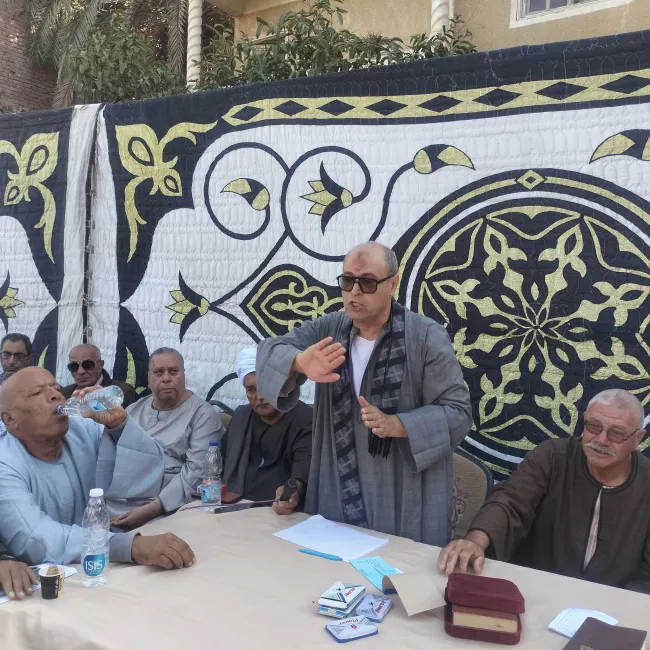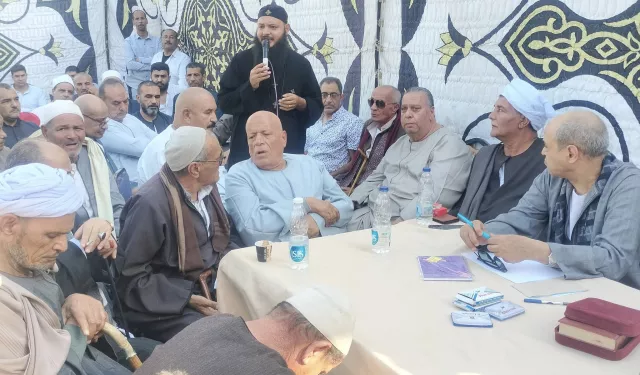A customary arbitration panel in Nazlet Gelf, Minya, on Friday ordered the expulsion of a Christian man accused of abducting his Muslim friend’s sister, giving his family five years to leave the village and fining them 1 million Egyptian pounds ($20,000), two arbitrators told Al Manassa.
The rulings came two days after a video circulated on social media showing stone-throwing at homes and acts of violence reportedly targeting Christian houses in the village. The unrest later escalated into the burning of some property on agricultural land owned by them.
According to a video clip, the disciplinary council’s decision allowed the girl’s family—which accuses the young man of taking their daughter to his home after she fainted—to pursue the legal case they had filed, without being forced to withdraw their official complaints.
Although the text of the ruling recorded in the video did not include any mention of expulsion, customary arbitrator Mohamed El-Sharouny acknowledged to Al Manassa that the panel had concluded that the young man must leave the village immediately. His family was given up to five years to arrange their affairs and depart “without pressure or coercion,” as he put it.
El-Sharouny justified the harsher penalties by saying, “The ruling had to be deterrent in order to contain the anger of the villagers and to prevent the recurrence of such incidents that threaten social peace.”
But researcher Ishak Ibrahim, who oversees the freedom of religion and belief file at the Egyptian Initiative for Personal Rights/EIPR, questioned the abduction narrative and criticized the logic behind the penalties. “If official judicial proceedings are going to continue against the young man, why is he being forced to pay one million pounds? And if he is going to be displaced from the village, why should he pay?” he asked. Ibrahim added that one million pounds as “blood money” is a highly exaggerated figure, even by customary standards in murder cases.
Two narratives, as usual

Customary arbitrator Hani El-Basel speaking at the customary meeting, Oct. 24, 2025El-Sharouny explained that representatives of the girl’s family accused the young man before the arbitration panel, in the presence of his family’s representatives, of taking her away after she fainted in a shop. “The story began when the young man went to buy some groceries from a shop owned by the girl’s family. There, she fainted for unknown reasons, and instead of seeking help, the young man took her to his house and hid her,” he said.
He added, “When her family began searching for her and asked the young man’s family, they denied she was there, until a neighbor told them she was inside the house, where they found her unconscious.”
El-Sharouny confirmed that a medical examination was conducted on the girl and it showed she was “a virgin and had not been harmed in any way.” However, he said the young man’s and his family’s behavior was what provoked the anger among villagers. “What made things worse for the people was that the girl was taken, and when asked, they said she wasn’t there. What was the point of that? If they had said she was there and had fainted, nothing would have happened. But to deny it, lock the door, and for them to find her on a bed in the innermost room—that arouses suspicion and doubt,” he said.
In contrast, Ibrahim criticized the customary committee’s adoption of the girl’s family’s “kidnapping” version while ignoring another narrative that suggested a romantic relationship. He described this as “expected, given that these sessions reflect power balances on the ground and aim to extinguish fires rather than address their roots.”
Punishments between “deterrence” and “excess”
El-Sharouny did not deny that his opinion inside the arbitration council was opposed to the idea of expelling the Christian young man’s family from the village, but said the majority decided otherwise, citing the principle of “preventing harm takes precedence over bringing benefit.” He added, “If the boy had stayed, he might have been killed. The expulsion was to protect him, protect his family, and calm the atmosphere.”
He continued, “We went to the session and found that both families had agreed and signed papers on these principles in the presence of Major General Adel Makram from the Minya Security Directorate and Mahmoud Yehia, the village mayor, stating that the young man would leave the village. They had finalized everything, so our main role was determining the amount of the financial penalty.”
Customary arbitrator Hani El-Basel, who participated in issuing the penalties and appeared in the video reading the decisions, confirmed to Al Manassa that the final rulings came after lengthy discussions involving 13 arbitrators. Responding to accusations of religious bias, he said, “I went on behalf of everyone, not for the Muslims or the Christians. I will be held accountable for my judgment on the Day of Judgment. The most important thing is that we reached safety for everyone.”
El-Basel added that the decisions reflected the arbitrators’ perspective during a critical moment. “Those who weren’t in the thick of it can say whatever they want, but the village was in turmoil, and we had to absorb the anger of the youth. Arbitration depends on the arbitrators’ judgment, and that’s what they saw,” he said.
He stressed that the purpose of customary sessions is not only to punish the wrongdoer but to restore stability to the community. “Money comes and goes; what matters is love and peace among people. I swear to Almighty God, I am saddened—we want Egypt to be decent, where the Muslim is a brother to the Christian, and the Christian is a brother to the Muslim,” he said.
El-Sharouny said the financial penalty was debated among the arbitrators, ranging from 400,000 to 500,000 pounds, before some proposed 1.5 million. It was ultimately reduced to 1 million “out of respect for the boy’s grandfather, who stood in the session and said my grandson was wrong and that there was no intent to hide the girl.”
El-Sharouny argued that the ruling was not discriminatory, citing a previous case in the same village where the mayor imposed a similar penalty on a Muslim young man who harassed a Christian girl and decided to leave the village. “We do not differentiate in applying custom based on religion,” he said.
However, EIPR’s Ibrahim said it was “unimaginable” that a Muslim youth would ever be forced to leave his home under similar circumstances, let alone have his family penalized. “Is there such a thing as deliberate kidnapping and unintentional kidnapping? There is no such thing either in law or in logic. Either there is a kidnapping crime that goes to the prosecution, or there isn’t one at all,” he said.
The researcher added that the idea of kidnapping in a rural village where everyone knows each other is “virtually impossible.”
“I understand that expelling the young man may sometimes be necessary in rural areas to calm the situation,” he said. “But the entire story—with its collective punishment of Christians through the burning of shacks on their farmland, the stoning of their homes, the huge financial fines, and the expulsion decision—carries an element of excess.”
Ibrahim warned that the most dangerous aspect of the customary session’s decisions is the message they send to society. “The message is clear: a Christian girl should not host a Muslim girl in her home, and a Muslim girl should not go to a Christian’s home. A rule has been established that mere presence in the other’s house has become suspicious. This destroys the remaining fabric of rural social life, where people used to look after one another,” he said.
Calls for investigation
Former MP and current parliamentary candidate on the National List Maha Abdel Nasser called for an urgent and transparent investigation into the incident and decisive application of the law to all parties without discrimination. She rejected customary reconciliation sessions “because they entrench a climate of impunity and weaken trust in state institutions.”
Abdel Nasser rejected viewing the attacks on Christian homes and farms as isolated incidents. “They are part of a recurring pattern that strikes at the heart of national unity,” she said. “The recurrence of these events confirms the existence of deep social and cultural roots to the tension that cannot be resolved through temporary security measures or superficial reconciliation sessions.”
She considered that the root solution lies in swiftly establishing the “Anti-Discrimination Commission,” whose draft law was submitted two years ago but has not yet been discussed despite being a constitutional requirement. Activating this commission, she said, is no longer a political luxury but “an urgent national necessity” to confront hate speech and bigotry. “What happened in Minya is a new alarm bell that requires a a real stand from all state institutions and society,” she said.
